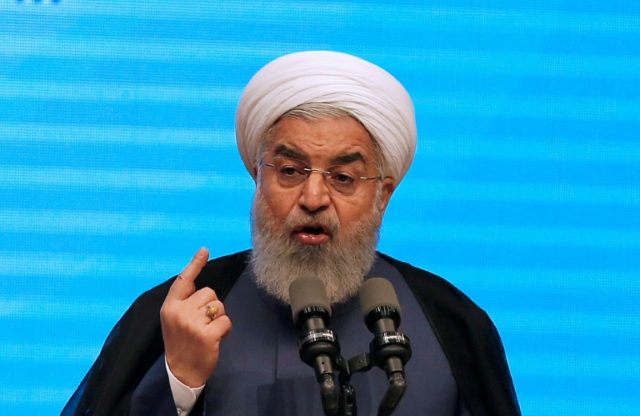Iranian President Hassan Rouhani abruptly reversed his position on talks with the United States on Monday, just hours before tough U.S. sanctions went back into effect. After a week of arrogantly dismissing President Donald Trump’s offer of direct talks, Rouhani said he was willing to negotiate with the United States “right now,” without preconditions.
“I don’t have preconditions. If the U.S. government is willing, let’s start right now. If there is sincerity, Iran has always welcomed dialogue and negotiations,” Rouhani said in an interview with Iranian state-run television.
That’s a very different tune than the one Rouhani was singing just a week ago when he sneered that talking with Trump was pointless because “the decisions of the new U.S. administration are fleeting.”
“Based on our bad experiences in negotiations with America and based on the U.S. officials’ violation of their commitments, it is natural that we see no value in Trump’s proposal,” the head of Iran’s Strategic Council on Foreign Relations added.
Iranian officials stipulated all sorts of preconditions the U.S. would have to meet before talks would be considered, such as “respecting the Iranian nation’s rights, reducing hostilities and returning to the nuclear deal,” in the words of a top Rouhani adviser.
Ongoing protests against his regime by Iranian citizens, the growing realization that Europe cannot save him from American sanctions, and the prospect of an uncomfortable chat with the Iranian parliament about the dismal state of the economy apparently adjusted Rouhani’s attitude.
President Trump stressed Iran’s isolation on Tuesday, applying pressure to Iran’s weakest spots by emphasizing that European businesses will be forced to choose between dealing with Iran or the United States, and reminding all parties that the real sanctions agony begins in November when the hammer comes down on Iran’s oil industry:
Rouhani naturally wishes to appear belligerent and defiant as he opens the door to the negotiations he once scorned. President Trump will probably want to give sanctions a little more time to work on Rouhani because the Iranian president’s ostensibly unconditional offer of talks on Monday came with one rather large condition: he expects the United States to pay Iran some form of “reparations” for six decades of shoddy treatment.
As Fox News summarized on Tuesday:
Trump signed an executive order on Monday to restore some of the sanctions that were lifted under the 2015 nuclear deal during the Obama administration, targeting transactions that involve U.S. dollars, as well as the country’s automotive sector, the purchase of commercial planes and metals including gold.
Iranian President Hassan Rouhani responded Monday, “If someone has knife in the hand and seeks talks, he should first put the knife in his pocket.”
Rouhani said he has no pre-conditions for opening talks with the U.S. as long as the Islamic Republic gets paid back for decades of American “intervention in Iran.”
“If the U.S. government is ready to negotiate about paying compensation to the Iranian nation from 1953 until now,” Rouhani said. “The U.S owes the Iranian nation for its intervention in Iran.”
Rouhani appears to be referencing the CIA-backed mission to overthrow Iran’s elected prime minister to secure the shah’s rule in 1953, a similar sentiment touted by many of his predecessors.
Rouhani also qualified his willingness to talk by denouncing U.S. sanctions as an attack on “Iranian children and people,” complaining about Trump withdrawing from the Paris climate accords, and accusing him of using sanctions to “create skepticism in the Iranian people to be able to use it in the coming Congress elections.”
National Security Adviser John Bolton indicated in a CNN interview on Tuesday that Rouhani’s offer to talk isn’t being taken all that seriously in Washington just yet.
“Let’s see what really comes of it or whether it’s just more propaganda,” said Bolton. “If the Iranians are really willing to come and talk about all of their malign behavior in the region and around the world, I think they’d find the President willing to do it.”

COMMENTS
Please let us know if you're having issues with commenting.